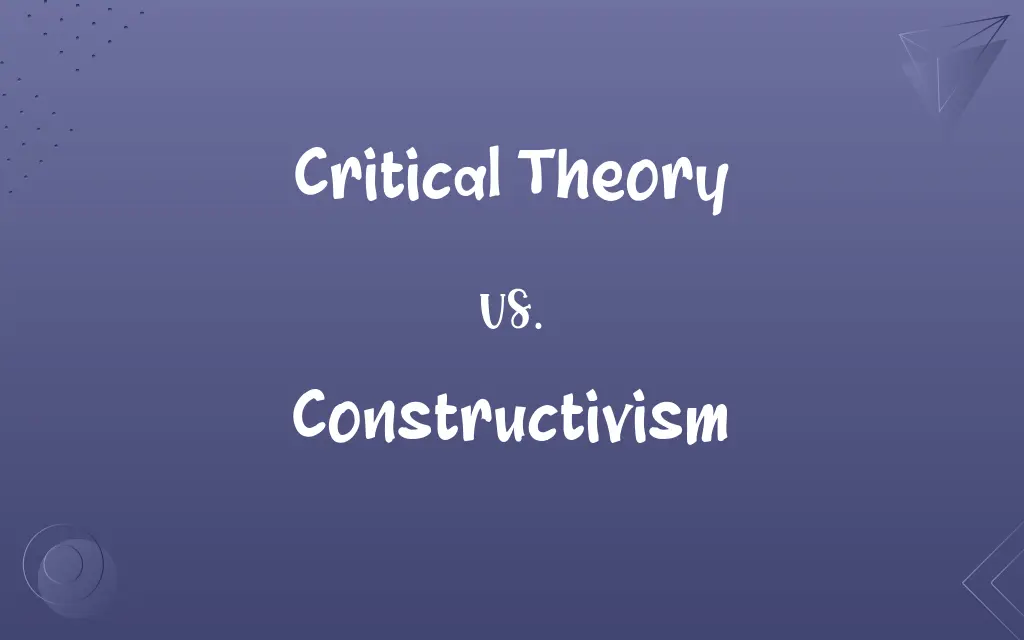Critical Theory vs. Constructivism: Know the Difference

By Shumaila Saeed || Published on December 29, 2023
Critical Theory critiques social structures, focusing on power dynamics and inequalities, while Constructivism emphasizes knowledge construction through experiences and interactions.

Key Differences
Critical Theory is rooted in examining and challenging social structures, power dynamics, and inequalities. It seeks to understand and critique the societal norms that perpetuate power imbalances. Constructivism, on the other hand, is a learning theory that posits individuals construct their own understanding and knowledge of the world, through experiencing things and reflecting on those experiences.
Shumaila Saeed
Dec 29, 2023
In Critical Theory, the focus is on critiquing and changing society, particularly in terms of power structures and cultural ideologies. It often involves analyzing how societal structures oppress or marginalize certain groups. Conversely, Constructivism centers on how individuals learn and construct knowledge, emphasizing that learning is an active, contextualized process of constructing knowledge rather than acquiring it.
Shumaila Saeed
Dec 29, 2023
Critical Theory often involves a critical examination of language, literature, and cultural practices to uncover hidden power dynamics. It engages with concepts like hegemony, ideology, and cultural criticism. In contrast, Constructivism is concerned with the process of learning, positing that learning is best facilitated in an environment where learners actively engage in constructing their own understanding.
Shumaila Saeed
Dec 29, 2023
The approach of Critical Theory is predominantly socio-political, focusing on critiquing and changing societal norms and power structures. It is often associated with social justice and aims to empower marginalized groups. On the other hand, Constructivism emphasizes the role of learners in actively constructing their own knowledge, highlighting the importance of interaction, experience, and context in learning.
Shumaila Saeed
Dec 29, 2023
Critical Theory is interdisciplinary, drawing from sociology, philosophy, and literature to analyze and critique social issues. It emphasizes the need for societal change and empowerment. Constructivism, however, is primarily an educational theory, focusing on how knowledge is constructed within the learner, emphasizing hands-on, active learning over passive reception of information.
Shumaila Saeed
Dec 29, 2023
ADVERTISEMENT
Comparison Chart
Focus
Social structures, power dynamics
Knowledge construction, learning process
Shumaila Saeed
Dec 29, 2023
Key Concepts
Power, ideology, social justice
Experience, interaction, context
Shumaila Saeed
Dec 29, 2023
Application
Cultural critique, empowerment
Learning methods, educational practice
Shumaila Saeed
Dec 29, 2023
ADVERTISEMENT
Critical Theory and Constructivism Definitions
Critical Theory
It interrogates the relationship between knowledge, power, and social structures.
Critical Theory helps decipher the power dynamics in educational curricula.
Shumaila Saeed
Dec 15, 2023
Constructivism
It emphasizes active, contextualized learning over passive reception.
Using Constructivism, the teacher facilitated a group project to teach history.
Shumaila Saeed
Dec 15, 2023
Critical Theory
It focuses on critiquing culture and ideology to promote social change.
Through Critical Theory, we understand how advertising perpetuates consumerism.
Shumaila Saeed
Dec 15, 2023
Constructivism
It advocates for hands-on experiences and interaction in the learning process.
Constructivism was applied in art class, where students created their own sculptures.
Shumaila Saeed
Dec 15, 2023
Critical Theory
Critical Theory challenges dominant societal norms and hegemonic practices.
The book used Critical Theory to question traditional gender roles.
Shumaila Saeed
Dec 15, 2023
ADVERTISEMENT
Constructivism
Constructivism posits that knowledge is constructed through experience.
In Constructivism, students learn physics concepts by conducting experiments.
Shumaila Saeed
Dec 15, 2023
Critical Theory
Critical Theory analyzes societal structures to reveal power imbalances.
Critical Theory examines media representation to uncover hidden biases.
Shumaila Saeed
Dec 15, 2023
Constructivism
Constructivism views learners as active participants in their own education.
Constructivism encourages students to question and explore topics independently.
Shumaila Saeed
Dec 15, 2023
Critical Theory
Critical Theory seeks to empower marginalized groups by exposing inequalities.
Applying Critical Theory, the film critiqued the marginalization of minority communities.
Shumaila Saeed
Dec 15, 2023
Constructivism
Constructivism focuses on learner-centered education and inquiry-based learning.
In a Constructivist classroom, students explored concepts through guided discovery.
Shumaila Saeed
Dec 15, 2023
Constructivism
A movement in modern art originating in Moscow in 1920 and characterized by the use of industrial materials such as glass, sheet metal, and plastic to create nonrepresentational, often geometric objects.
Shumaila Saeed
Dec 13, 2023
Constructivism
(arts) A Russian movement in modern art characterized by the creation of nonrepresentational geometric objects using industrial materials.
Shumaila Saeed
Dec 13, 2023
Constructivism
(mathematics) A philosophy that asserts the need to construct a mathematical object to prove it exists.
Shumaila Saeed
Dec 13, 2023
Constructivism
A psychological epistemology which argues that humans generate knowledge and meaning from their experiences.
Shumaila Saeed
Dec 13, 2023
Constructivism
An abstractionist artistic movement in Russia after World War I; industrial materials were used to construct nonrepresentational objects
Shumaila Saeed
Dec 13, 2023
Repeatedly Asked Queries
How does Constructivism influence teaching methods?
It leads to more hands-on, interactive, and student-centered teaching practices.
Shumaila Saeed
Dec 29, 2023
How does Critical Theory view language?
It sees language as a tool that can both reflect and perpetuate power imbalances in society.
Shumaila Saeed
Dec 29, 2023
What is Critical Theory?
It's a theory focusing on critiquing and changing society, especially in terms of power structures and cultural ideologies.
Shumaila Saeed
Dec 29, 2023
How does Critical Theory apply to education?
It encourages critical thinking about societal norms and the power structures within education systems.
Shumaila Saeed
Dec 29, 2023
Can Critical Theory be applied to literature?
Yes, it's often used to analyze texts for underlying power dynamics and social critiques.
Shumaila Saeed
Dec 29, 2023
Can Critical Theory be applied to politics?
Absolutely, it often critiques political systems and ideologies for inherent power imbalances.
Shumaila Saeed
Dec 29, 2023
Is Constructivism limited to classroom settings?
No, it's applicable in any learning environment, including informal and experiential settings.
Shumaila Saeed
Dec 29, 2023
What role do experiences play in Constructivism?
Experiences are central, as they are the primary source through which knowledge is constructed.
Shumaila Saeed
Dec 29, 2023
Does Constructivism require collaboration among learners?
While not required, it highly values collaboration as a means of enhancing the learning process.
Shumaila Saeed
Dec 29, 2023
Is technology important in Constructivist learning?
Technology can enhance Constructivist learning by providing interactive and experiential learning tools.
Shumaila Saeed
Dec 29, 2023
What is Constructivism?
It's a learning theory that emphasizes knowledge construction through individual experiences and interactions.
Shumaila Saeed
Dec 29, 2023
How does Constructivism view the learner's role?
It sees learners as active participants in their own learning process.
Shumaila Saeed
Dec 29, 2023
Is Constructivism effective for all subjects?
It's generally effective, though its applicability may vary depending on the subject matter.
Shumaila Saeed
Dec 29, 2023
Does Critical Theory support social change?
Yes, one of its main goals is to promote social change by challenging existing power structures.
Shumaila Saeed
Dec 29, 2023
What is the main critique of Critical Theory?
Some argue it's overly focused on criticism without offering practical solutions.
Shumaila Saeed
Dec 29, 2023
What skills does Constructivism develop in learners?
It develops critical thinking, problem-solving, and independent learning skills.
Shumaila Saeed
Dec 29, 2023
Can Critical Theory be optimistic?
While critical, it can be optimistic in its advocacy for potential societal improvements.
Shumaila Saeed
Dec 29, 2023
How does Critical Theory relate to feminism?
It intersects with feminism in critiquing patriarchal structures and promoting gender equality.
Shumaila Saeed
Dec 29, 2023
How does Critical Theory view media?
It often analyzes media as a means of perpetuating or challenging societal norms.
Shumaila Saeed
Dec 29, 2023
How does Constructivism affect assessment methods?
It favors assessments that reflect real-world applications and individual understanding.
Shumaila Saeed
Dec 29, 2023
Share this page
Link for your blog / website
HTML
Link to share via messenger
About Author
Written by
Shumaila SaeedShumaila Saeed, an expert content creator with 6 years of experience, specializes in distilling complex topics into easily digestible comparisons, shining a light on the nuances that both inform and educate readers with clarity and accuracy.








































































